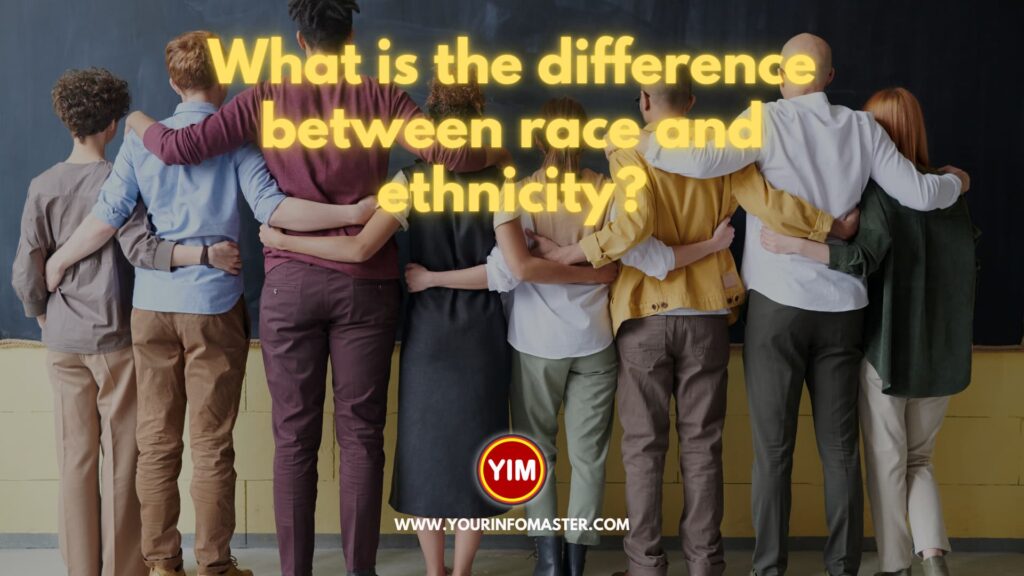The terms “race” and “ethnicity” are often used interchangeably, leading to confusion about their meanings. While they share some similarities, race and ethnicity are distinct concepts that refer to different aspects of a person’s identity. In this post, we will explore what is differences between race and ethnicity?
What is the difference between race and ethnicity?
1. Definition
Race refers to a person’s physical characteristics, such as skin color, hair texture, and facial features. It is often used to categorize people into groups based on these physical characteristics. Ethnicity, on the other hand, refers to a person’s cultural identity, including language, religion, customs, and traditions.
2. Biological vs. Cultural
Race is often considered to be a biological concept, while ethnicity is a cultural one. Race is based on physical characteristics that are determined by genetics, while ethnicity is based on cultural factors that are learned and passed down through generations.
3. Objective vs. Subjective
Race is often viewed as an objective category, with people being classified into groups based on their physical features. Ethnicity, on the other hand, is more subjective, as people can identify with a particular ethnicity based on their cultural background, regardless of their physical appearance.
4. Historical Context
Race has a long and complicated history, with different groups being discriminated against and oppressed based on their race. Ethnicity, while also having a complex history, is often more tied to cultural traditions and practices.
5. Social Construct
Race is a social construct, meaning that it is a concept created and defined by society. Ethnicity, while also shaped by social and cultural factors, is more closely tied to a person’s individual identity.
6. Diversity
Race is often seen as a way to categorize people into distinct groups, while ethnicity allows for more nuance and diversity within those groups. For example, two people of the same race may have very different ethnic backgrounds and cultural identities.
7.nFluidity
Ethnicity is more fluid than race, as people can identify with multiple ethnicities or change their ethnic identity over time. Race, on the other hand, is often seen as a fixed category that cannot be changed.
8. Influence on Identity
Both race and ethnicity can influence a person’s sense of identity and belonging, but ethnicity is often more closely tied to a person’s cultural background and traditions.
9.mIntersectionality
Race and ethnicity are often intersected with other social categories, such as gender, sexuality, and class, to create complex identities and experiences. For example, a black woman may face different forms of discrimination and marginalization than a black man or a white woman.
10. Implications in Society
Race and ethnicity have significant implications in society, particularly in terms of access to resources, opportunities, and power. Racial and ethnic disparities exist in areas such as education, healthcare, and criminal justice, and addressing these disparities requires understanding the complex and interconnected factors that contribute to them.
Summary of difference between race and ethnicity
Here are 10 key differences between race and ethnicity:
- Race refers to physical characteristics, while ethnicity refers to cultural identity.
- Race is biological, while ethnicity is cultural.
- Race is objective, while ethnicity is subjective.
- Race has a long and complicated history, while ethnicity is tied to cultural traditions.
- Race is a social construct, while ethnicity is more closely tied to individual identity.
- Ethnicity allows for more nuance and diversity within racial groups.
- Ethnicity is more fluid than race.
- Ethnicity is more closely tied to a person’s cultural background and traditions.
- Race and ethnicity intersect with other social categories to create complex identities and experiences.
- Race and ethnicity have significant implications in society, particularly in terms of access to resources, opportunities, and power.
Conclusion
In conclusion, while race and ethnicity are often used interchangeably, they are distinct concepts that refer to different aspects of a person’s identity. Understanding these differences is important for addressing issues of discrimination, inequality, and social justice. By recognizing and celebrating the diversity and complexity of both race and ethnicity, we can move towards a more equitable and inclusive society.

